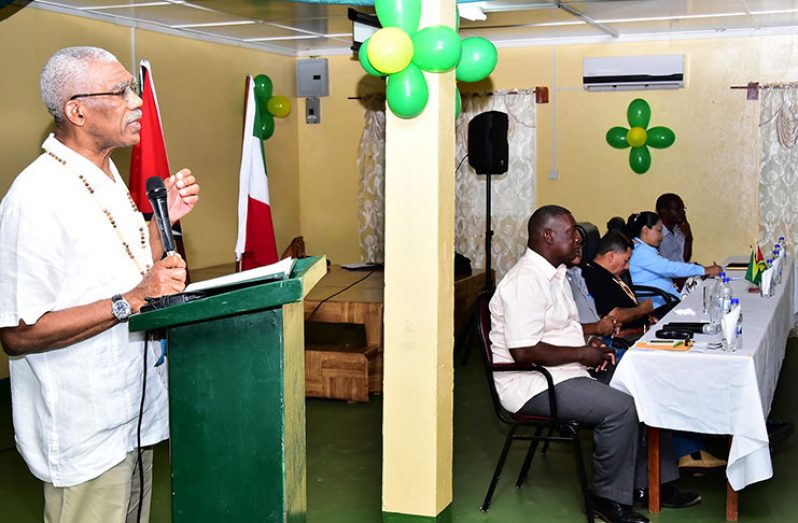-President Granger tells Rupununi residents
PRESIDENT David Granger has charged residents of Upper Takutu-Upper Essequibo (Region Nine) to take responsibility for the prosperity and development of their villages, communities and region and ultimately the country, as he noted that Lethem must fulfil its mission as a capital town by driving the development of the region through investments, infrastructure and information technology.
The President, who spent Friday in the region meeting with regional officials, security forces and residents, urged them to become entrepreneurs and develop their villages and towns, particularly in the areas of ‘green’ energy, tourism and Information and Communication Technology (ICT). “When we speak about development, we also speak about telecommunications and ‘green’ energy. Rupununi has the largest volume and hours of sunlight in the entire country.
Let us turn Lethem green; ‘green’ energy must power our buildings, our ministries, our hospitals, our schools, our police stations. Let us introduce more communications technology. Lethem must be a well-wired town. We can only improve communications if we adopt ICT much more quickly and seriously than we are doing,” the President said.
President Granger said that upper Region Nine was the largest region in the country, but much more had to be done to improve investment and infrastructural development and added that his Government stood ready to work with regional and local Government to ensure the vast region reached its potential. The town of Lethem, he said, was filled with foreign investors and while the country and Government welcomed this, Guyanese must themselves increase their own economic activity.
The Head of State said that Lethem needed increased economic activity to create jobs, generate wealth and reduce poverty and noted that investment could spur that movement in the economy. “Guyana must be able to rely on all sections of society. We have to own the Rupununi. We are obstructing the development of this large region. We are hindering our own development. We must take collective leadership of this region,” the President said.
Vice-President and Minister of Indigenous People’s’ Affairs, Mr. Sydney Allicock, echoed these sentiments, noting that while the region had tremendous potential, it was now up to the people to work to make that potential become a reality.
“This is the time when unity is needed to move us out of the troubled times. We would love to do much more for you, but we need the participation of the villages, communities and the Regional Development Council. We would love to see a plan to move this region forward because it is the largest region in Guyana. It takes unity and unity is strength.
You have to have vision, will, skill and sustainability. Let us work together, let us unite. There is no time for us to fight. Let us attack the issues rather than personalities and let us come up with plans together to develop together,” he urged.
To aid this development, however, President Granger said that proper infrastructure was a key element. “We need to look at infrastructure. We need to do more. We need to do better. We need to ensure that this region has a better aerodrome, bridges, roadways. I see the region as being a place that can attract investment…
Your region must have a better aerodrome; the best in all the regions, a world-class aerodrome so people can fly legally from anywhere and land here, but the infrastructure must be improved. We have to move the Rupununi into the future and I am sure with the Town Council and the [Regional Democratic Council] RDC you would be able to move the town further down the road of development,” he said.
The holding of Local Government Elections for the first time in over two decades, the President said, restored the representative character of towns and Neighbourhood Democratic Councils (NDCs) by paving the way for citizens to choose their own local leaders. More importantly, those historic elections saw the creation of three new towns at Lethem, Bartica and Mabaruma, which the President said, were geared at ensuring that every citizen can access social services in their own regions.
Meanwhile, Regional Chairman, Mr. Brian Allicock, in brief remarks, said that it was commendable that the President decided to spend a day in the region to speak to officials and residents and listen to their concerns. “Our neighbours [in Brazil] usually ask, do you get to meet the President face to face and we say of course.
They would always say that it has been decades and they haven’t met their President or seen him face to face, so we are fortunate to have the President here with us. This region is the largest within the country. We are often in the news today and we have to look at that to see how we can be curb. It must be positive things about the region when we are in the news. It should not be negative things,” he said.
Ms. Dawn Hastings-Williams, Minister within the Ministry of Communities, who was also present at the community meeting, said to make all of those things possible it was important that citizens work together with the Government, irrespective of their differences.




.png)









